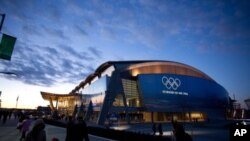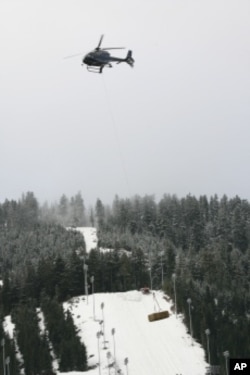When the Vancouver Organizing Committee put together an environmentally-sensitive plan to make their 2010 Winter Olympics green, they weren't imagining green ski slopes. But unseasonably warm weather at the outset of the games forced organizers to haul in fresh snow by the truckload and air-drop it on some alpine venues. Despite the unforeseen carbon emissions, Vancouver expects to deliver the greenest Olympics on record.
Going Green
Vancouver's plan to green the Olympics started even before the city won the bid to host the 2010 Winter Games, says Ann Duffy, director of the corporate sustainability program for Vancouver's Olympic Organizing Committee. "Early in 2000 to 2003, we like to say we had over 1,000 conversations with environmental organizations across Canada as well as first-nation communities whose territories the games would occur on, business, the industry sector as well as the our host communities of Whistler and Vancouver," says Duffy.
Duffy notes that every venue was built according to Canada's current nation-wide green-building standards. The Olympic venues make smart use of glass and windows, capture rain water from roofs to irrigate landscaping and reduce water usage with low-flow toilets. And Duffy says the organizing committee called for an innovative district-wide energy system. In the case of Vancouver that's using waste heat from the sewer line. In Whistler, it's using waste heat from the waste water treatment plant.
Duffy says the city's Olympic organizers are also committed to offset some 118,000 tons of CO2 emissions produced during the construction and use of the Olympic site, through a series of projects that employ clean energy technologies. "About 50 percent of our offsets are in Canada, and we had a particular interest in investing in technologies that showcase where the low carbon economy is going."
Bronze Medal
Duffy adds that the Committee has also targeted gold standard projects that non-governmental organizations would recognize.
The 118,000-ton CO2 offset is substantial, but represents only half of the Games-related emissions, according to Paul Lingl. He's with the non-profit Suzuki Foundation, and is co-author of a 2008 report on green games requested by Vancouver organizers. Even before the Feb.12 opening ceremonies, Lingl says the foundation issued a scorecard, giving the 2010 Winter Games a bronze medal for climate performance.
The scorecard applauds Vancouver for green design, clean energy, and emissions measurements and reductions. But Lingl says while a fleet of fuel-efficient vehicles and hydrogen fuel cell buses are in town for the games, the city failed to provide the region with any long-term transportation solutions. "In fact, for the Vancouver Olympics, $600 million were spent to widen the highway and we felt that [there] could have been more sustainable transportation options built for the games," says Lingl.
Lingl adds that if the Olympic movement is serious about reducing the games' negative impact on the global climate, it may have to rethink its approach to running the games. "It just does not make sense to, every two years, build a new Olympics in a new city that has to build all these venues over and over again."
Recycle host cities
Lingl says the International Olympic Committee, or IOC, could recycle host cities with venues in place that can be upgraded and reused. He also urges the IOC to require all future host cities to follow climate-friendly standards. He suggests that the IOC help cities that can't afford to comply. "Maybe fund some of these initiatives, for example, with media revenues to implement some of these green infrastructure projects," he says.
Ann Duffy, with Vancouver's Olympic organizing committee, wouldn't predict whether the IOC will make green design mandatory for all future Olympics. But one legacy from Vancouver 2010, she says, is a Sustainable Sport and Event Toolkit. "That's a how-to guide to help host cities plan games that have minimum impact on the environment, but that are also ethical, inclusive, financially successful and, of course, exciting," she says.





